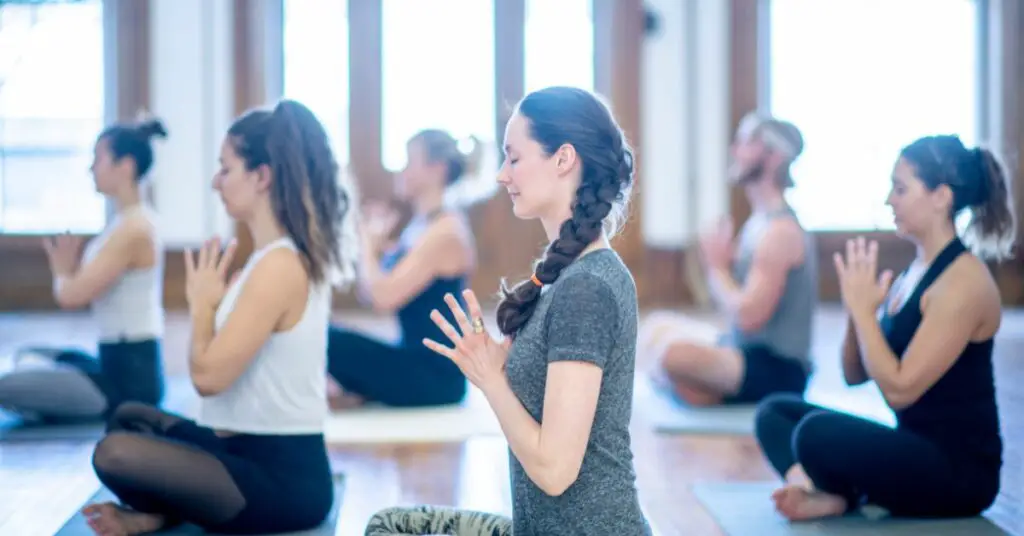In our fast-paced, constantly connected world, it’s no wonder that so many of us feel overworked and stressed.
But there is a way to combat this: meditation.
Though it may seem like an odd solution, research has shown that meditation can be incredibly beneficial for both our mental and physical health.
It helps us to relax and focus, and it can also improve our cognitive function.
In short, meditation is a powerful tool that we can use to improve our lives in many ways.
How much do monks meditate? A lot. They often spend hours each day in meditation, and the practice has helped them to achieve amazing things.
Monks have been practicing meditation for centuries, and they know all about its benefits. In fact, many people believe that monks are some of the most peaceful and content people on Earth.

How Do Monks Meditate?
Meditation used by monks involves practising mindfulness and balanced understanding of your breath, thoughts, and sensations. Monks use different techniques to meditate, but the most common one involves sitting in a lotus pose with hands resting on the knees. Monks then focus their attention on their breathing pattern while consciously letting go of any distracting thoughts or feelings.
Monks may also practice visualization techniques like focusing on images in their mind’s eye or repeating mantras to help them stay present and focused. Monks also use mindfulness techniques such as body scans and mindful walking to help keep their minds in the present moment.
How Often Do Monks Meditate?
Monks are well known for their dedication to meditation and spiritual practice. Monks typically meditate anywhere from three to eight hours a day, depending on the tradition or Monastery they belong to. Monasteries may also require additional religious services and rituals that do not involve meditation, such as chanting or reading scriptures. Monks often spend large portions of the day meditating, with short breaks for meals and rest. Monks typically practice meditation in both group and individual settings, in order to deepen their understanding of the teachings. Monks may also participate in longer retreats devoted solely to meditation. During these retreats, monks will often meditate nonstop for days or even weeks at a time. Monks may also engage in solitary retreats for extended periods of time. Monks practice meditation not only to attain spiritual enlightenment, but also as a way to cultivate inner peace and clarity of mind.
Where Do Monks Meditate?
Monks typically meditate in different places depending on their religious order or tradition.
Monasteries are popular places for monks to go to meditate, but they can also be found in temples, caves, and nature spots. Monks often prefer to meditate in quiet areas where they can practice without disruption and disturbance. Monasteries provide an environment that is conducive to meditation as there are minimal distractions and noise.
Monks may also choose to practice their meditation outdoors in places such as forests, beaches or gardens. Monks have also been known to practice meditation in caves as a way of escaping from the hustle and bustle of human life.
Meditation can be practiced anywhere, but it is important for monks to find a place that works best for them and their spiritual practice. Monks may even travel to different places around the world in order to find the perfect place for their meditation. Monks often prefer quiet and peaceful places, as they need a distraction-free environment to practice their spiritual devotion. So it’s clear that finding the right place is an essential part of their journey.
How Often Does a Buddhist Monk Meditate?
Buddhist Monks are well known for their daily practice of meditation. The average amount of time a monk will meditate each day can vary greatly depending on the particular tradition they follow.
Typically, monks from most Buddhist traditions will spend several hours a day in formal meditation sessions, along with additional time for contemplation and prayer throughout the day. Monks may meditate for as little as one hour per day or up to eight hours or more if their schedule allows. Monks often wake up very early in the morning to begin their meditation practices, many times before dawn. Meditation is a central part of Buddhist practice, so it is important that Monks dedicate much of their day to this activity. Ultimately, the amount of time Monks dedicate to meditation is up to each individual Monastery and its traditions, but they generally commit a significant portion of the day to this important practice.
Benefits that Monks who practice meditation receive
By committing so much of their day to meditation, Monks can cultivate inner qualities such as mindfulness, compassion and wisdom that help them become more aware individuals and better serve others in the world. Through regular practice Monks can gain greater insight into themselves as well as an understanding of how life works on deeper levels. The benefits Monks receive from this time spent in intense meditation is immeasurable and a great example of the power this practice has. Monks are truly dedicated to their spiritual growth and it shows in how much time they invest each day into meditation.
Did Lord Buddha meditate?
Did Lord Buddha meditate? Absolutely! The records of his life show that he devoted a great deal of time to meditation during his spiritual journey towards enlightenment. He was known to have spent long periods in meditation, sometimes even days or weeks at a time. Monks who followed the teachings of Lord Buddha continued this practice and even taught it to others as part of the Buddhist tradition. Meditation is still an important part of Buddhism today, with many people engaging in regular practice for its well-known benefits which include relaxation and improved concentration. No matter where you go, it is clear that Lord Buddha’s teachings on meditation still have a strong influence in the world today.
Meditation has been an integral part of Buddhism since its beginning and helps practitioners find peace within themselves.
Did Dalai Lama Meditate? How Often He Meditated?
The Dalai Lama is one of the most well-known Monks in the world, and he is also a great advocate for meditation. He has spoken on many occasions about its benefits, saying that it can help us to increase our focus and awareness. But did Dalai Lama himself meditate?
The answer is absolutely yes! The Dalai Lama practiced meditation every day as part of his daily routine – often spending up to 6 hours per day in meditation. He was particularly fond of doing koan practice, which is an ancient form of Chinese Zen Buddhism that uses paradoxical questions to guide the practitioner into deeper states of clarity and understanding.
The Dalai Lama believed strongly in the power of meditation, saying “through meditation we can make our minds more flexible and open,” and “meditation can help us to realize the nature of reality.” He would often teach his followers how to meditate, encouraging them to take up a regular practice that could benefit their mental and physical health.
The Dalai Lama’s commitment to meditation set an example for Monks all over the world and continues to inspire people to this day. Whether you are looking for inner peace or seeking a deeper understanding of life, meditation can be an invaluable tool – one that was embraced by the Dalai Lama himself.
So the answer is yes – Dalai Lama did meditate, and he did so often!
What are some of the Challenges that Monks Face when They Meditate?
Monks face a variety of challenges when they practice meditation. The most common one is staying focused and present in the moment, with all of their thoughts and feelings — especially during long periods of sitting meditation.
Monks must also guard against attachment to results or outcomes; instead, monks are encouraged to just observe what arises without judgment or expectation.
Monks may struggle with balancing normal daily activities such as work, chores and personal relationships while still maintaining an inner balance through regular practice. Monks can easily become overwhelmed by the many distractions that come with leading a social life, so learning how to keep oneself disciplined and focused while meditating is essential.
Finally, sometimes physical pain or discomfort can arise during extended sessions of mindfulness meditation; some monks have difficulty managing pain and maintaining focus, which can be a challenge. With discipline, attention and dedication, monks do overcome these challenges and develop their own meditation practice.
Monks have been meditating for centuries and reaping the benefits, so why not join them?
With just 10 minutes of time a day, you could start to experience amazing changes in your life.
Happy meditating!




